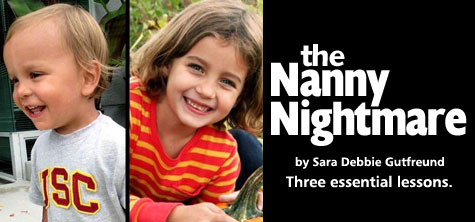 Iran’s Attack on Israel
Iran’s Attack on Israel


6 min read
Three essential lessons.
When I read about the devastating murder of two young children by their nanny in Manhattan, my heart stopped for a moment. My hands shook as I zipped up my own two-year-old's coat, and I could not stop thinking about the photo of the mother, Marina Krim, in the ambulance, screaming in anguish.
Many people sent bouquets of flowers to the Krim's apartment building on the Upper West Side, and others posted condolences on Marina's blog, Life with the Krim Kids, where she chronicled her children's milestones and lives. Just that morning before the tragedy, Marina had posted:
"One of the best parts of my day is after I drop both girls off at school and have 3 precious hours with little Lito all to myself. Ok, I am near getting cheesy I adore this boy so much."
Her blog posts and photos reveal her love and pride in her three children. The nanny, Yoselyn Oretga, was hired by the Krims two years ago when they first moved to New York so that Marina could spend individual time with each child. At the time of the murder, Marina was with her 3-year-old at a swimming lesson. If you wanted to paint a portrait of an ideal, stay-at-home mother, Marina would be it.
How could they speak that way about a mother whose two children were just murdered?
Which is why I was shocked and sickened to read a number of critical, biting posts about this unfortunate mother. She shouldn't have hired a nanny if she wasn't working. She should have seen the warning signs of her nanny's psychological problems. I wondered if any of these posters were mothers themselves. Otherwise how could they speak that way about a mother whose two children were just murdered?
Mothers often feel guilty no matter what they do, even if no one overtly criticizes them. If they work, they are neglecting their children. If they stay home, they aren't being productive. If they hire help, they are spoiled. If they try to do everything themselves, they are martyrs. When mothers pay too much attention to their children, they are smothering. When they don't pay enough attention, they're too distant.
I'll never forget the fear I felt holding my first baby in my arms; I didn't know that it was possible to love someone that intensely and that unconditionally. And the power of that love scared me because suddenly my heart felt like it was literally on my sleeve. In the days after the Krim tragedy, I prayed that the mother wasn't seeing any of the awful, inappropriate posts about the story. I could just imagine (actually I really can't ) how my own thoughts would go right to blaming myself. Why didn't I notice that the babysitter was grumpy? Why didn't I shlep all the kids to the swimming lesson? Why couldn’t I have gotten home a little faster? Why? Why? Why?
Mothers often think this way about anything that goes wrong for their children. It starts during pregnancy. Maybe if I would have eaten healthier my child wouldn't have any problems. And it continues to kindergarten and beyond. If a child misbehaves in school, a mother wonders if there is something wrong with her parenting. If a teenager has low self-esteem, the mother wonders if she said something wrong, did something wrong, felt something wrong.
I think this self-blame stems directly from the strength of a mother's love, and she knows on some essential level that life doesn't necessarily work that way. We can be the ideal portraits of giving, loving mothers, but that doesn't guarantee that our children are going to thrive. And our desire to protect our offspring doesn't mean that they will never be hurt, no matter how much we want that to be true.
As I was staring at the bouquets of flowers lying by the side of the Krim's apartment building, I felt myself grieving not only for this horrific loss but also for the millions of mothers everywhere who must be thinking: This can happen to me. Who can I trust in this crazy world? How can I leave my children even for a minute? And how do we make sense of this tragedy in our own lives?
I’ve learned three lessons from this nanny nightmare:
In the face of such an unfathomable tragedy, we can learn compassion, gratitude, kindness. I can't erase the image of Marina Krim screaming at the back of the ambulance. But I can feel her pain. And maybe I can be a better mother and a better person if I hear the message in her grief.
